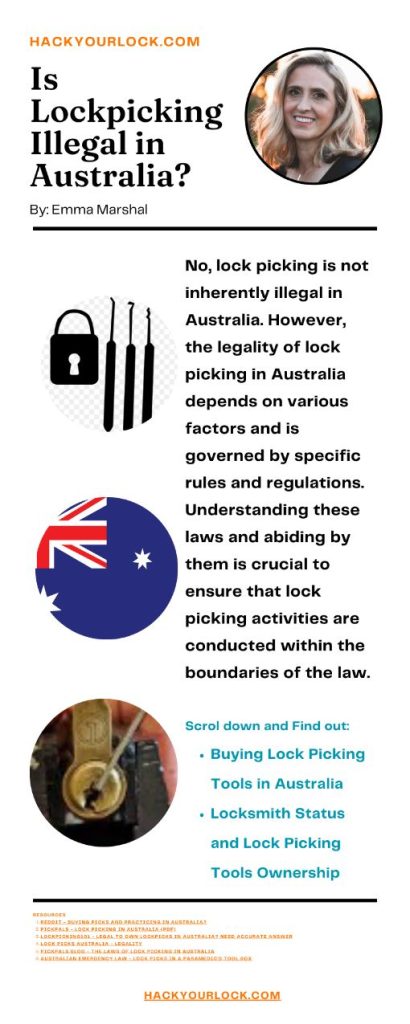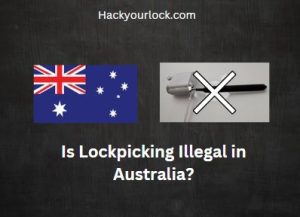Have you ever found yourself pondering the legality of lock picking in Australia? It’s a captivating skill that ignites curiosity and raises numerous questions. The question often surfaces: “Is Lock Picking Illegal in Australia?”

In this article, we’ll explore the laws in Australia and answer some of the most common questions surrounding this intriguing practice. So, let’s embark on a journey to unlock the truth about lock picking.
Contents
- 1 Is Lockpicking Illegal in Australia?
- 2 Buying Lock Picking Tools in Australia
- 3 Can I Carry My Lockpicking Gear Around With Me?
- 4 Locksmith Status and Lock Picking Tools Ownership
- 5 Can I carry lock picks when traveling?
- 6 State Variations in Lock Picking Laws
- 7 Lock Picking Code of Conduct
- 8 Lock Picking Rules
- 9 Lock Picking Laws and Regulations in Australian States/Territories
- 10 Conclusion
- 11 FAQ’s
- 12 Resources
Is Lockpicking Illegal in Australia?

No, lock picking is not inherently illegal in Australia. However, the legality of lock picking in Australia depends on various factors and is governed by specific rules and regulations. Understanding these laws and abiding by them is crucial to ensure that lock picking activities are conducted within the boundaries of the law.
Buying Lock Picking Tools in Australia
One of the first questions that comes to mind is, “Is it legal to buy lock picking tools in Australia?” The good news is that buying lock picking tools is generally allowed. But before you go shopping, there are certain restrictions and requirements you should be aware of.
While buying lock picking tools is generally allowed in Australia, there are specific restrictions and requirements you should be aware of:
1. Age Restrictions
You must typically be at least 18 to purchase lock picking tools legally.
2. Legitimate Purpose
You should have a legitimate reason for owning lock picking tools. Being a locksmith or a member of a lock sport organization is considered a valid purpose.
3. Identity Verification
Some sellers may require you to provide identification and proof of your legitimate purpose for buying lock picking tools.
4. Purchase Location
Buying lock picking tools from reputable sources and businesses that adhere to legal guidelines is important.
5. Responsibility
Understand that owning lock picking tools comes with a responsibility to use them ethically and within the bounds of the law.
Can I Carry My Lockpicking Gear Around With Me?
Now, can you carry your lockpicking gear around with you? The answer is more than a simple ‘yes’ or ‘no.’ The legality of carrying lock picking equipment depends on various factors, including the concept of ‘intent’ and when it might cross the line into illegality.
| Aspect | Legality of Carrying Lock Picking Equipment in Australia |
| Ownership and Purpose | Owning lock picking equipment for legitimate purposes (e.g., locksmithing, lock sport) is legal. |
| Intent and Use | Carrying lock picking equipment intending to be used for criminal activities is illegal. |
| Legitimate Carriage | Responsibly carrying lock picking tools for legitimate purposes is generally allowed. |
| Criminal Intent | Carrying lock picking tools with the intent to commit unlawful activities is a legal violation. |
| Ethical Use | Using lock picking tools responsibly and ethically is expected and encouraged. |
Locksmith Status and Lock Picking Tools Ownership
Do you need to be a locksmith to own or buy lock picking tools? The answer is a resounding ‘no,’ but there are specific considerations regarding locksmith certification that you should understand.
| Aspect | Locksmith Certification and Lock Picking Tools Ownership in Australia |
| Locksmith Status | You do not need to become a licensed locksmith to own or buy lock picking tools. |
| Locksmith Certification | Locksmith certification is required if you wish to work as a professional locksmith. |
| Professional Practice | Locksmiths must adhere to specific regulations and licensing requirements. |
| Certification Authority | Relevant state authorities typically issue locksmith certification. |
| Responsibility | If you own lock picking tools, using them responsibly and legally is essential. |
| Ethical Guidelines | Locksmiths and lock pickers should follow ethical guidelines and respect privacy. |
In Australia, the specific names of locksmith certification, locksmith licensing, regulations, and licensing requirements may vary by state and territory. However, here are some general terms and authorities often associated with locksmith certification and licensing:
- Locksmith Certification Authority: Certification for locksmiths is typically issued by state or territory regulatory bodies or authorities responsible for security and licensing. Depending on the region, specific names might include the Department of Fair Trading, Consumer Affairs, or similar agencies.
- Locksmith Licensing: Locksmiths may need to obtain a license to practice their trade legally. The names of these licenses can differ by jurisdiction but are often referred to as “Locksmith License” or “Security Industry License.”
- Locksmith Regulations: Regulations governing locksmiths are set forth by the state or territory government, often under laws related to security and safety. These regulations outline the requirements and standards that locksmiths must adhere to.
- Licensing Requirements: Licensing requirements for locksmiths typically include background checks, completion of accredited training or apprenticeship programs, and passing relevant exams. The specific requirements can vary by region.
Can I carry lock picks when traveling?
If you’re a lock picking enthusiast or a locksmith, the idea of traveling with your lock picks might be tempting. However, it’s essential to understand the rules and guidelines for carrying lock picks when traveling in Australia.

Here, we’ll explore what’s allowed and consider international factors to ensure a smooth and lawful journey.
Domestic Travel within Australia
Carrying lock picks is generally allowed when traveling domestically within Australia, provided you have a legitimate reason. This might include attending lock sports events, locksmithing work, or other valid purposes.
However, always carry your lock picks responsibly, securely, and in a way that doesn’t arouse suspicion.
International Travel
International travel with lock picks can be more complex. Different countries have varying regulations regarding the possession of lock picking tools.
Before embarking on an international trip with your lock picks, it’s crucial to research the specific laws and regulations of your destination country.
Some countries may consider lock picks as prohibited items, and attempting to bring them into the country could result in legal trouble.
It’s advisable to check with the embassy or consulate of your destination to understand their stance on lock picking tools.
Precautions when Traveling with Lock Picks
1. Declare Them
If you decide to travel with lock picks internationally and they are allowed at your destination, it’s essential to declare them at customs to avoid any misunderstandings.
2. Research Local Laws
Before you travel, research the lock picking laws of the country you’re visiting to ensure compliance. Some countries may have strict regulations or bans on lock picks.
3. Travel Case
Keep your lock picks in a secure and clearly labeled travel case to demonstrate that you have a legitimate purpose for carrying them.
4. Check Airline Policies
If you’re flying, check with your airline regarding their policies on carrying lock picks in your carry-on or checked luggage.
Traveling Responsibly
While traveling with lock picks is possible, it’s crucial to approach it with responsibility and awareness of the Lock Picks Australia – Legality, laws and regulations, both within Australia and internationally.
Always prioritize safety, compliance with local laws, and respect for your destination country’s rules to ensure a trouble-free and enjoyable trip.
State Variations in Lock Picking Laws
Lock picking laws in Australia can vary from one state to another, and it’s essential to be aware of these potential differences.
Understanding State-Specific Lock Picking Laws
1. New South Wales (NSW)
Lock picking is generally allowed for licensed locksmiths and lock sports enthusiasts who follow ethical guidelines. Unlawful possession or use can lead to penalties.
2. Victoria
Lock picking is legal for licensed locksmiths and hobbyists involved in lock sport. Unauthorized use can result in legal consequences.
3. Queensland
Locksmiths and registered businesses can use lock picks for legitimate purposes. Possession without a valid reason is prohibited.
4. South Australia
Lock picking tools are considered controlled weapons. Owning them without lawful excuse is illegal.
5. Western Australia
Lock picking tools are controlled items, and their possession is regulated. A legitimate reason is required for ownership.
6. Tasmania
Lock picking tools are restricted, and their possession without lawful excuse is prohibited.
7. Northern Territory
Lock picking tools are regulated, and ownership is allowed for authorized individuals with valid reasons.
Are the lock picking laws in my state different?
The answer is yes. Lock picking laws vary from state to state within Australia. It’s crucial to familiarize yourself with the specific regulations in your state to ensure compliance and avoid legal issues. Always act responsibly and ethically when practicing lock picking, respecting both state laws and personal ethics.
Lock Picking Code of Conduct
Lock picking carries ethical and responsible considerations. In this section, we emphasize a code of conduct that prioritizes these principles:
1. Privacy Respect
Lock pickers must never invade privacy or gain unauthorized access. All lock picking must adhere to the law and respect personal space.
2. Property Rights
Lock pickers must avoid causing property damage. Gain access responsibly and without harm.
3. Legitimate Use
Lock picking is for legitimate purposes like locksmithing, personal skill development, or lock sport.
4. Education
Proper training ensures safe and responsible lock picking, including understanding regional laws.
Lock Picking Rules
Exploring rules for lock pickers is essential for safety and responsibility:
1. Law Adherence
Always follow lock picking laws and regulations, respecting legal boundaries.
2. Ethical Practice
Use lock picking skills ethically, respecting individuals’ rights and privacy.
3. Authorized Use
Only pick locks with explicit permission, such as your property or for lock sport.
4. Continuous Learning
Stay updated on best practices and ethics through ongoing education.
5. Prioritize Safety
Use proper tools and techniques for safe lock picking.
By adhering to these guidelines, lock pickers can enjoy their craft responsibly and with integrity, creating a positive and constructive experience.
Lock Picking Laws and Regulations in Australian States/Territories
The laws of lock picking in Australia, territory wise are stated below:
| State/Territory | Lock Picking Laws and Regulations | Details and Considerations |
| New South Wales | Security Industry Act 1997 (NSW) | Lock picking allowed for licensed locksmiths and hobbyists who adhere to ethical guidelines. Unlawful use can lead to penalties. |
| Victoria | Private Security Act 2004 (VIC) | Lock picking is allowed for licensed locksmiths and lock sports enthusiasts. Unauthorized use may have legal consequences. |
| Queensland | Security Providers Act 1993 (QLD) | Locksmiths and registered businesses can use lock picks for legitimate purposes. Possession without a valid reason is prohibited. |
| South Australia | Controlled Substances Act 1984 (SA) | Lock picking tools are classified as controlled weapons. Ownership without lawful excuse is illegal. |
| Western Australia | Weapons Regulations 1999 (WA) | Lock picking tools are controlled items, and a legitimate reason is required for ownership. |
| Tasmania | Police Offences Act 1935 (TAS) | Lock picking tools are restricted, and their possession without lawful excuse is prohibited. |
| Northern Territory | Weapons Control Act (NT) | Lock picking tools are regulated, and ownership is allowed for authorized individuals with valid reasons. |
Conclusion
In conclusion, “Is Lock Picking Illegal in Australia?” Lock picking, in and of itself, is not inherently illegal in Australia. However, its legality varies across states and territories, subject to specific regulations.
It is essential to comprehend and adhere to regional laws, maintain ethical practices, and use lock picking skills responsibly. Respect for privacy and property rights should always be paramount.
Ultimately, lock picking can be enjoyed as a legitimate skill or hobby when practiced within the bounds of the law and with ethical consideration.
FAQ’s
Is lock picking a useful skill for non-locksmiths in Australia?
Lock picking can be a valuable skill for non-locksmiths in Australia, particularly for individuals who may find themselves locked out of their homes or vehicles. However, it’s crucial to use this skill responsibly and within the bounds of Australian lock picking laws, which can vary by state and territory.
Are there any lock picking courses or training available to the public in Australia?
Yes, in Australia, lock picking courses and training programs are available to the public. Locksmith associations and security training institutions often offer these courses. However, ensuring that the training you receive aligns with Australian lock picking regulations and ethical guidelines is important.
Can lock picking tools be purchased easily online in Australia?
Lock picking tools are available for purchase online in Australia, but their sale may be subject to legal restrictions depending on the state or territory. Researching and understanding the lock picking laws in your area within Australia is essential before buying lock picking tools. Additionally, only acquire them if you have a legitimate purpose, such as lock sport or locksmithing, and always use them responsibly and ethically.
Resources
- Reddit – Buying picks and practicing in Australia?
- PickPals – LOCK PICKING IN AUSTRALIA (PDF)
- Lockpicking101 – Legal to own lockpicks in Australia? Need accurate answer
- Lock Picks Australia – Legality
- PickPals Blog – The laws of lock picking in Australia
- Australian Emergency Law – Lock picks in a paramedic’s tool box
